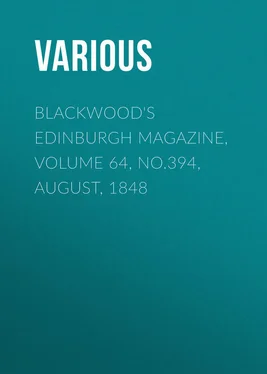Various - Blackwood's Edinburgh Magazine, Volume 64, No.394, August, 1848
Здесь есть возможность читать онлайн «Various - Blackwood's Edinburgh Magazine, Volume 64, No.394, August, 1848» — ознакомительный отрывок электронной книги совершенно бесплатно, а после прочтения отрывка купить полную версию. В некоторых случаях можно слушать аудио, скачать через торрент в формате fb2 и присутствует краткое содержание. Издательство: Иностранный паблик, Жанр: periodic, foreign_edu, Путешествия и география, на английском языке. Описание произведения, (предисловие) а так же отзывы посетителей доступны на портале библиотеки ЛибКат.
- Название:Blackwood's Edinburgh Magazine, Volume 64, No.394, August, 1848
- Автор:
- Издательство:Иностранный паблик
- Жанр:
- Год:неизвестен
- ISBN:нет данных
- Рейтинг книги:5 / 5. Голосов: 1
-
Избранное:Добавить в избранное
- Отзывы:
-
Ваша оценка:
- 100
- 1
- 2
- 3
- 4
- 5
Blackwood's Edinburgh Magazine, Volume 64, No.394, August, 1848: краткое содержание, описание и аннотация
Предлагаем к чтению аннотацию, описание, краткое содержание или предисловие (зависит от того, что написал сам автор книги «Blackwood's Edinburgh Magazine, Volume 64, No.394, August, 1848»). Если вы не нашли необходимую информацию о книге — напишите в комментариях, мы постараемся отыскать её.
Blackwood's Edinburgh Magazine, Volume 64, No.394, August, 1848 — читать онлайн ознакомительный отрывок
Ниже представлен текст книги, разбитый по страницам. Система сохранения места последней прочитанной страницы, позволяет с удобством читать онлайн бесплатно книгу «Blackwood's Edinburgh Magazine, Volume 64, No.394, August, 1848», без необходимости каждый раз заново искать на чём Вы остановились. Поставьте закладку, и сможете в любой момент перейти на страницу, на которой закончили чтение.
Интервал:
Закладка:
"Tszoo – tszoo!" they cry, "wah, kashne, ceitcha – get on, you devilish beasts – tszoo – tszoo!" and belabouring them without mercy, start them into a gallop, which, once effected, they generally continue till they reach their destination.
The Indian dogs are, however, invariably well treated by the squaws, since they assist materially the everyday labours of these patient overworked creatures, in hauling firewood to the lodge, and, on the line of march, carrying many of the household goods and chattels which otherwise the squaw herself would have to carry on her back. Every lodge possesses from half-a-dozen to a score, – some for draught and others for eating, – for dog meat forms part and parcel of an Indian feast. The former are stout, wiry animals, half wolf half sheep-dog, and are regularly trained to draught; the latter are of a smaller kind, more inclined to fat, and embrace every variety of the genus cur. Many of the southern tribes possess a breed of dogs entirely divested of hair, which evidently have come from South America, and are esteemed highly for the kettle. Their meat, in appearance and flavour, resembles young pork, but far surpasses it in richness and delicacy of flavour.
The Sioux are very expert in making their lodges comfortable, taking more pains in their construction than most Indians. They are all of conical form: a framework of straight slender poles, resembling hop-poles, and from twenty to twenty-five feet long, is first erected, round which is stretched a sheeting of buffalo robes, softly dressed, and smoked to render them watertight. The apex, through which the ends of the poles protrude, is left open to allow the smoke to escape. A small opening, sufficient to permit the entrance of a man, is made on one side, over which is hung a door of buffalo hide. A lodge of the common size contains about twelve or fourteen skins, and contains comfortably a family of twelve in number. The fire is made in the centre immediately under the aperture in the roof, and a flap of the upper skins, is closed or extended at pleasure, serving as a cowl or chimney-top to regulate the draught and permit the smoke to escape freely. Round the fire, with their feet towards it, the inmates sleep on skins and buffalo rugs, which are rolled up during the day, and stowed at the back of the lodge.
In travelling, the lodge-poles are secured half on each side a horse, and the skins placed on transversal bars near the ends, which trail along the ground, – two or three squaws or children mounted on the same horse, or the smallest of the latter borne in the dog travées. A set of lodge-poles will last from three to seven years, unless the village is constantly on the move, when they are soon worn out in trailing over the gravelly prairie. They are usually of ash, which grows on many of the mountain creeks, and regular expeditions are undertaken when a supply is required, either for their own lodges, or for trading with those tribes who inhabit the prairies at a great distance from the locality where the poles are procured.
There are also certain creeks where the Indians resort to lay in a store of kinnik-kinnik, (the inner bark of the red, willow,) which they use as a substitute for tobacco, and which has an aromatic and very pungent flavour. It is prepared for smoking by being scraped in thin curly flakes from the slender saplings, and crisped before the fire, after which it is rubbed between the hands into a form resembling leaf-tobacco, and stored in skin bags for use. It has a highly narcotic effect on those not habituated to its use, and produces a heaviness sometimes approaching stupefaction, altogether different from the soothing effects of tobacco.
Every year, owing to the disappearance of the buffalo from their former haunts, the Indians are necessitated to encroach upon each other's hunting-grounds, which is a fruitful cause of war between the different tribes. It is a curious fact, that the buffalo retire before the whites, while the presence of Indians in their pastures appears in no degree to disturb them. Wherever a few white hunters are congregated in a trading port, or elsewhere, so sure it is that, if they remain in the same locality, the buffalo will desert the vicinity, and seek pasture elsewhere; and in this, the Indians affirm the wah-keitcha, or "bad medicine," of the pale-faces is very apparent; and ground their well-founded complaints of the encroachments made upon their hunting-grounds by the white hunters.
In the winter, many of the tribes are reduced to the very verge of starvation – the buffalo having passed from their country into that of their enemies, when no other alternative is offered them, but to remain where they are and starve, or follow the game into a hostile region, entailing a war and all its horrors upon them.
Reckless, moreover, of the future, in order to prepare robes for the traders, and procure the pernicious fire-water, they wantonly slaughter vast numbers of buffalo cows every year, (the skins of which sex only are dressed,) and thus add to the evils in store for them. When questioned on this subject, and such want of foresight being pointed out to them, they answer, that however quickly the buffalo disappears, the Red man "goes under" in greater proportion; and that the Great Spirit has ordained that both shall be "rubbed out" from the face of nature at one and the same time, – "that arrows and bullets are not more fatal to the buffalo than the small-pox and fire-water to them, and that before many winters' snows have disappeared, the buffalo and the Red man will only be remembered by their bones, which will strew the plains." – "They look forward, however, to a future state, when, after a long journey, they will reach the happy hunting-grounds, where buffalo will once more blacken the prairies; where the pale-faces daren't come to disturb them; where no winter snows cover the ground, and the buffalo are always plentiful and fat."
As soon as the streams opened, La Bonté, now reduced to but two animals and four traps, sallied forth again, this time seeking the dangerous country of the Blackfeet, on the head waters of the Yellow Stone and Upper Missouri. He was accompanied by three others, a man named Wheeler, and one Cross-Eagle, a Swede, who had been many years in the western country. Reaching the fork of a small creek, on both of which appeared plenty of beaver sign, La Bonté followed the left-hand one alone, whilst the others trapped the right in company, the former leaving his squaw in the company of a Sioux woman, who followed the fortunes of Cross-Eagle, the party agreeing to rendezvous at the junction of the two forks as soon as they had trapped to their heads and again descended them. The larger party were the first to reach the rendezvous, and camped on the banks of the main stream to await the arrival of La Bonté.
The morning after their return, they had just risen from their blankets, and were lazily stretching themselves before the fire, when a volley of firearms rattled from the bank of the creek, and two of their number fell dead to the ground, at the same moment that the deafening yells of Indians broke upon the ears of the frightened squaws. Cross-Eagle seized his rifle, and, though severely wounded, rushed to the cover of a hollow tree which stood near, and crawling into it, defended himself the whole day with the greatest obstinacy, killing five Indians outright, and wounding several more. Unable to drive the gallant trapper from his retreat, the savages took advantage of a favourable wind which sprang up suddenly, and fired the long and dried-up grass which surrounded the tree. The rotten log catching fire at length compelled the hunter to leave his retreat, and, clubbing his rifle, he charged amongst the Indians, and fell at last pierced through and through with wounds, but not before two more of his assailants had fallen by his hand.
Читать дальшеИнтервал:
Закладка:
Похожие книги на «Blackwood's Edinburgh Magazine, Volume 64, No.394, August, 1848»
Представляем Вашему вниманию похожие книги на «Blackwood's Edinburgh Magazine, Volume 64, No.394, August, 1848» списком для выбора. Мы отобрали схожую по названию и смыслу литературу в надежде предоставить читателям больше вариантов отыскать новые, интересные, ещё непрочитанные произведения.
Обсуждение, отзывы о книге «Blackwood's Edinburgh Magazine, Volume 64, No.394, August, 1848» и просто собственные мнения читателей. Оставьте ваши комментарии, напишите, что Вы думаете о произведении, его смысле или главных героях. Укажите что конкретно понравилось, а что нет, и почему Вы так считаете.












